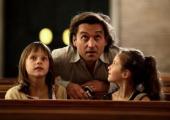Gainsbourg

Joann Sfar's biopic is a stylised, slightly shambolic recreation of the myth
Serge Gainsbourg, like Charles Bukowski, is one of those blokes who should be banned as a role model for impressionable young men, who may start imagining they too can behave like disgusting old soaks and pull any gorgeous bird who comes into their orbit. Note to Gainsbourg wannabes - this only works if you're a creative genius as well.









